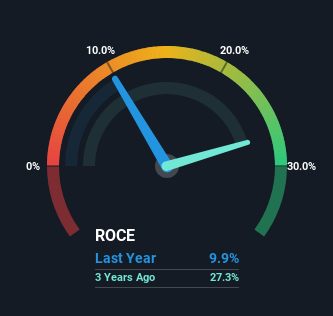- United States
- /
- Software
- /
- NasdaqGS:BSY
Bentley Systems' (NASDAQ:BSY) Returns On Capital Not Reflecting Well On The Business
To find a multi-bagger stock, what are the underlying trends we should look for in a business? Firstly, we'll want to see a proven return on capital employed (ROCE) that is increasing, and secondly, an expanding base of capital employed. This shows us that it's a compounding machine, able to continually reinvest its earnings back into the business and generate higher returns. In light of that, when we looked at Bentley Systems (NASDAQ:BSY) and its ROCE trend, we weren't exactly thrilled.
Return On Capital Employed (ROCE): What Is It?
If you haven't worked with ROCE before, it measures the 'return' (pre-tax profit) a company generates from capital employed in its business. The formula for this calculation on Bentley Systems is:
Return on Capital Employed = Earnings Before Interest and Tax (EBIT) ÷ (Total Assets - Current Liabilities)
0.099 = US$242m ÷ (US$3.1b - US$681m) (Based on the trailing twelve months to September 2023).
So, Bentley Systems has an ROCE of 9.9%. In absolute terms, that's a low return, but it's much better than the Software industry average of 7.7%.
See our latest analysis for Bentley Systems

In the above chart we have measured Bentley Systems' prior ROCE against its prior performance, but the future is arguably more important. If you're interested, you can view the analysts predictions in our free report on analyst forecasts for the company.
So How Is Bentley Systems' ROCE Trending?
In terms of Bentley Systems' historical ROCE movements, the trend isn't fantastic. Over the last four years, returns on capital have decreased to 9.9% from 22% four years ago. Although, given both revenue and the amount of assets employed in the business have increased, it could suggest the company is investing in growth, and the extra capital has led to a short-term reduction in ROCE. And if the increased capital generates additional returns, the business, and thus shareholders, will benefit in the long run.
On a related note, Bentley Systems has decreased its current liabilities to 22% of total assets. So we could link some of this to the decrease in ROCE. Effectively this means their suppliers or short-term creditors are funding less of the business, which reduces some elements of risk. Some would claim this reduces the business' efficiency at generating ROCE since it is now funding more of the operations with its own money.
What We Can Learn From Bentley Systems' ROCE
In summary, despite lower returns in the short term, we're encouraged to see that Bentley Systems is reinvesting for growth and has higher sales as a result. In light of this, the stock has only gained 5.2% over the last three years. So this stock may still be an appealing investment opportunity, if other fundamentals prove to be sound.
Like most companies, Bentley Systems does come with some risks, and we've found 1 warning sign that you should be aware of.
For those who like to invest in solid companies, check out this free list of companies with solid balance sheets and high returns on equity.
Valuation is complex, but we're here to simplify it.
Discover if Bentley Systems might be undervalued or overvalued with our detailed analysis, featuring fair value estimates, potential risks, dividends, insider trades, and its financial condition.
Access Free AnalysisHave feedback on this article? Concerned about the content? Get in touch with us directly. Alternatively, email editorial-team (at) simplywallst.com.
This article by Simply Wall St is general in nature. We provide commentary based on historical data and analyst forecasts only using an unbiased methodology and our articles are not intended to be financial advice. It does not constitute a recommendation to buy or sell any stock, and does not take account of your objectives, or your financial situation. We aim to bring you long-term focused analysis driven by fundamental data. Note that our analysis may not factor in the latest price-sensitive company announcements or qualitative material. Simply Wall St has no position in any stocks mentioned.
About NasdaqGS:BSY
Bentley Systems
Provides infrastructure engineering software solutions in the Americas, Europe, the Middle East, Africa, and the Asia-Pacific.
Moderate growth potential with low risk.
Similar Companies
Market Insights
Community Narratives



